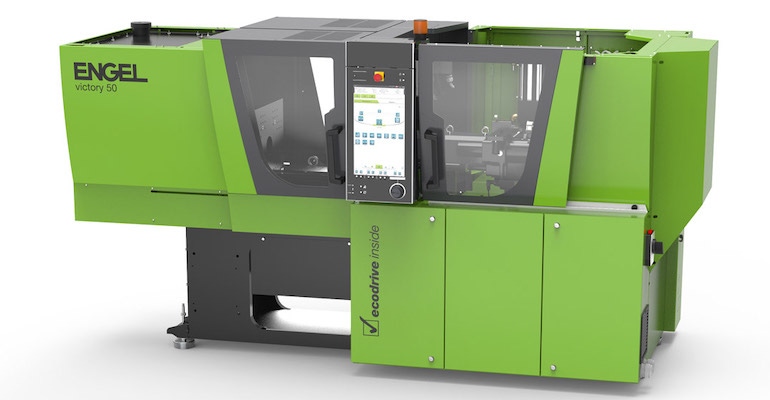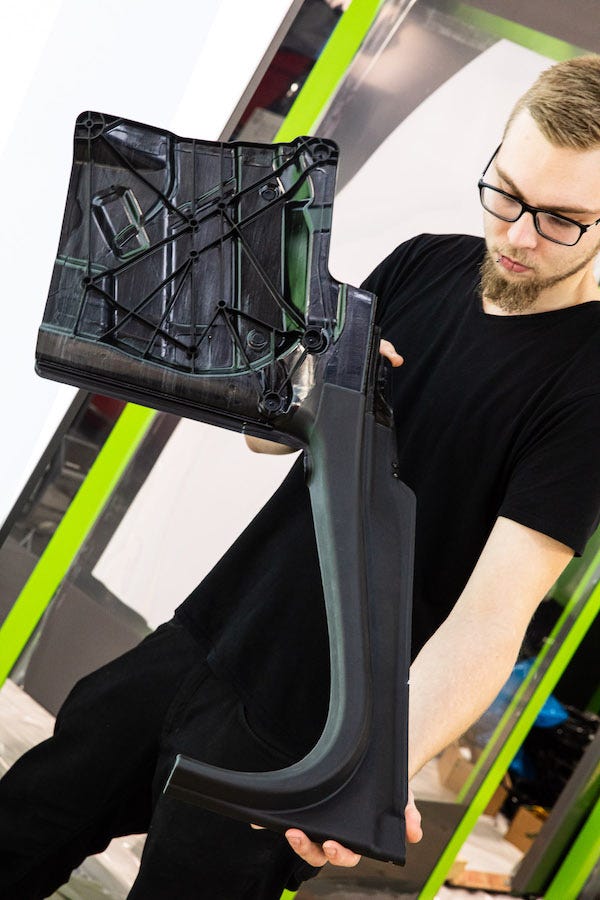Engel Engages at JEC World with Lightweight, Sustainable Composites
Engel will demonstrate how its organomelt process shapes and functionalizes organic sheets and unidirectional tapes in a single, integrated step.
March 31, 2022

JEC World 2022 from May 3 to 5 in Paris showcases the entire value chain of the composites industry. One important link in this chain is the shaping of thermoplastic fiber composite preforms. The Engel organomelt process takes this one step further. Organic sheets and unidirectional tapes are not just shaped, but also functionalized in one integrated step by overmolding the preforms. Engel will demonstrate the process at booth N79 in hall 5.
The main component of the production cell, which is producing demo parts made of continuous fiber-reinforced polyamide (PA), is a tie-bar-less Engel victory 200/50 injection molding machine equipped with an Engel viper 12 linear robot and a double-sided, vertical Engel IR oven. The component was designed by Brightlands Materials Center, an R&D center in the Netherlands focused on sustainable polymer solutions. Development of innovative lightweight thermoplastic composite technologies for sustainable mobility markets is one of their key research programs, which Engel supports through a partnership.
The prepreg heating process drives cycle time and quality
The composite blanks are heated in the IR oven, placed and formed in the mold, and overmolded with PA. Heating the prepregs is one of the process steps that drives cycle time and quality in the processing of fiber-reinforced preforms with a thermoplastic matrix. Thickness defines the heat-up and cool-down times. Heating the material quickly without damaging it is crucial, as are short paths for transporting the heated preforms to the mold.
Engel offers IR ovens from in-house development and production in various designs — both horizontal and vertical — and positions them in the production cell near the mold. The ovens and robots are fully integrated with the injection molding machine’s CC300 control unit and can be centrally controlled via the machine’s display.
The production cell on display at JEC makes extensive use of the efficiency potential of Engel's tie-bar-less technology for the organomelt process. The victory machine's biggest advantage in this application is its very fast hot handling. Barrier-free access to the mold area makes it possible to position the IR oven closer to the mold than would be possible for an injection molding machine with tie-bars, allowing the robot to take the shortest path from the oven to the mold. In this way, even very thin preforms can be processed.
The thermoplastic composite preforms were prepared in Engel's Center for Lightweight Composite Technologies in Austria. In practice, the production of thermoplastic composite blanks can be placed immediately upstream of the manufacturing process and directly next to the processing machine. Engel offers fully integrated systems, including the processing machine, robots, and IR ovens as well as pick-and-place tape stacking units with optical image processing and consolidation devices.
Leveraging lightweighting potential
Composite parts created using the Engel organomelt process combine light weight with excellent crash safety ratings. This technology, which is already in series production in the automotive industry, is suitable for both organic sheets and unidirectional (UD) glass and carbon fiber–reinforced tapes with a thermoplastic matrix. Using a thermoplastic material base enables particularly efficient, fully automated manufacturing processes because reinforcement ribs or assembly elements can be injected directly after forming in the same process step.
Engel will also present the production of vehicle door components at JEC World 2022.
|
Tapes make it possible to reinforce individual areas in the part to adapt to the load. The door module, produced through the Engel organomelt process, is more rigid in its window frame area than on the inside of the door. |
Three organic sheets in different geometries with thicknesses ranging between 0.6 and 2.5 mm are heated and formed via IR radiation and given a high-quality visible surface through injection molding in the same process step. The process was developed in collaboration with automotive supplier Brose and is fully automated.
You May Also Like



